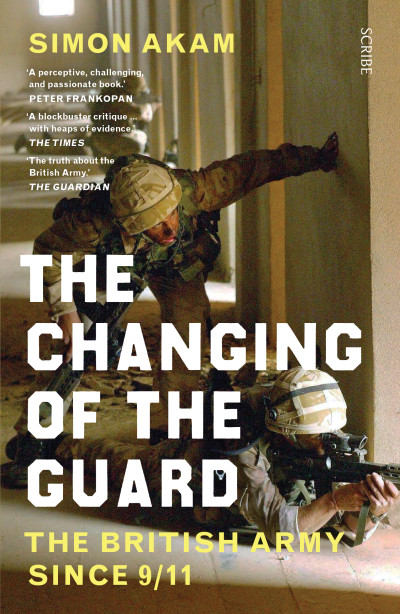‘This brave, absorbing and prodigiously well-researched tour de force renders every previous account of the British Army in its disastrous recent campaigns obsolete. Akam makes an unanswerable case that we are no longer very good at fighting wars, building his arguments with panache and good sense. In doing so he has done his country, and the army, a great service — although the Generals may not see it quite that way just yet. Put away the self-serving autobiographies and the obsequious histories of in-house academics; this is the definitive account of the British Army in its 21st Century misadventures.’
Frank Ledwidge, author of Losing Small Wars
‘Simon Akam delivers a devastating indictment of Britain’s military chiefs for overseeing the shocking decline of the nation’s armed forces. His book is compulsory reading for every patriot.’
Tom Bower, biographer
‘A brilliant book … Gets right to the heart of so many of the British Army’s problems.’
Simon Scarrow, Sunday Times bestselling author of the Eagles of the Empire series
‘A new book looks at the changes the British Army has undergone and roles it has played as an almost volunteer sidekick to the American military in the war on terror.’
CJ Chivers, The New York Times
‘The truth about the British Army’
Jason Burke, The Guardian
‘Akam is an angry young man and the book is better for it.’
The Times
‘A blockbuster critique … with heaps of evidence.’
Matthew Paris, The Times
‘A passionate book.’
Max Hastings, The Sunday Times
‘It’s compellingly written — I got through all 500-plus pages in two sittings — and it is certainly worth the effort.’
Adrian Weale, Mail on Sunday
‘Detailed and well structured.’
Anthony Loyd, New Statesman
‘Impassioned … It is a valuable addition to analysing the past, present and future of a venerated institution.’
Kim Sengupta, The Independent
‘A blistering account … Akam’s research, including interviews with 260 individuals, is formidable.’
Richard Norton-Taylor, Declassified UK
‘A scathing account of the British army in the years after 9/11 … Akam has not just done his homework, interviewing 260 people, but also shows his working in 89 pages of footnotes, full of forensic detail — and delicious gossip.’
Shashank Joshi, Spectator Australia
‘Akam makes many important points and reports in depth on officers’ recollections of specific episodes.’
Helen Parr, Prospect
‘The Changing of the Guard is a major book that provides the first serious analysis of the effectiveness of the modern British Army … With a particular focus on the failure of the wars in Iraq and Afghanistan, he gives a brunt assessment of the Army as an institution and its role in society. There is lots of interesting material here and some relevant lessons for Australia.’
Jeff Popple, Canberra Weekly
‘It is a review of the British Army … It does not tell a ‘pretty’ story — rather, it is a ‘warts and all’ tale … Simon Akam has written a fine book on how and why the British Army has changed, between 2001 and 2020. For those who have seen military service, it will provide a broad picture of the conditions some soldiers have faced in the early 21st Century. For those who have not, it shows clearly the true face of war, as it is fought in this day and age, and may, possibly, be fought in the near future and within current social value sets.’
Rob Ellis, RUSI VIC Library
‘[In] beautifully written, evocative and passionate prose, [Akam places] you in the boots of British soldiers in Iraq and Afghanistan suddenly discovering the mission they’ve volunteered for isn’t the war they’re fighting at all … He begins asking questions at ground level, 260 interviews probing everyone from commanders, medal winners to those convicted of war crimes … This breadth of research gives Akam’s book immense power.’
Nicholas Stuart, The Canberra Times
‘Simon Akam … has written a timely, elegant and important book, The Changing of the Guard, about the British army’s failures in Afghanistan and Iraq.’
David Patrikarakos, The Spectator
‘Full of gripping reportage and compelling personal stories … the story he tells is profoundly important.’
David French, TLS
‘A powerful, compelling, and fascinating polemic. Essential reading.’
William Boyd
‘A “state-of-the-nation” book of resounding power, deep conviction, and far-reaching significance.’
Richard Davenport-Hines, TLS
‘Akam contends that there was as little accountability within the military hierarchy as there was outside it … The military would obviously like to avoid a close examination of this unbroken string of catastrophes, but Akam’s book is a gentle account — critical, but not unsympathetic.’
Tom Stevenson, London Review of Books
‘Gripping and thoroughly disheartening.’
Al Murray
‘[A] valuable and salutary read.’
Foreign Affairs
‘The Changing of the Guard has contributed to the ongoing debate over how the British Army might change further as it enters a post-pandemic world where security challenges demand considerable flexibility of mind… Anything that provokes such self-awareness is good for institutions.’
War on the Rocks
‘This is an unofficial oral history, created by hundreds of interviews as well as documents and personal observations by the author … This is a well written, organised and researched book … It reads well and is dynamic keeping the reader engaged … I commend Simon Akam for creating an accurate book that could be used as a Leadership discussion case study for the British Army as well as other militaries … It should become required reading at Sandhurst and the UK Joint Services Command and Staff College as well as the Defence Academy of the UK.’
Preston McLaughlin, Small Wars Journal






